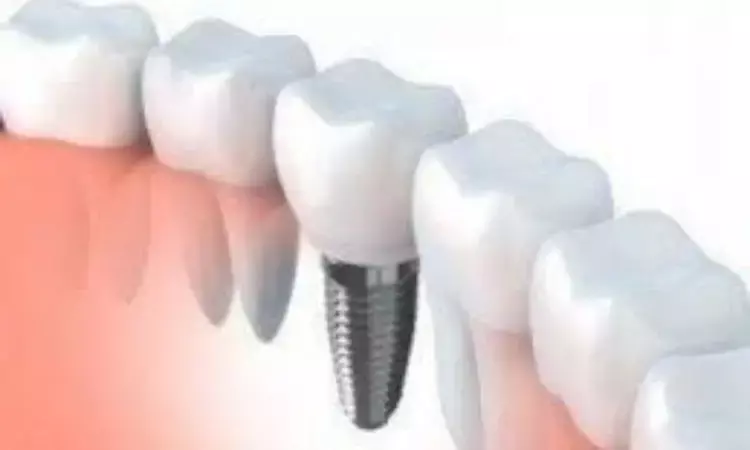- Home
- Medical news & Guidelines
- Anesthesiology
- Cardiology and CTVS
- Critical Care
- Dentistry
- Dermatology
- Diabetes and Endocrinology
- ENT
- Gastroenterology
- Medicine
- Nephrology
- Neurology
- Obstretics-Gynaecology
- Oncology
- Ophthalmology
- Orthopaedics
- Pediatrics-Neonatology
- Psychiatry
- Pulmonology
- Radiology
- Surgery
- Urology
- Laboratory Medicine
- Diet
- Nursing
- Paramedical
- Physiotherapy
- Health news
- Fact Check
- Bone Health Fact Check
- Brain Health Fact Check
- Cancer Related Fact Check
- Child Care Fact Check
- Dental and oral health fact check
- Diabetes and metabolic health fact check
- Diet and Nutrition Fact Check
- Eye and ENT Care Fact Check
- Fitness fact check
- Gut health fact check
- Heart health fact check
- Kidney health fact check
- Medical education fact check
- Men's health fact check
- Respiratory fact check
- Skin and hair care fact check
- Vaccine and Immunization fact check
- Women's health fact check
- AYUSH
- State News
- Andaman and Nicobar Islands
- Andhra Pradesh
- Arunachal Pradesh
- Assam
- Bihar
- Chandigarh
- Chattisgarh
- Dadra and Nagar Haveli
- Daman and Diu
- Delhi
- Goa
- Gujarat
- Haryana
- Himachal Pradesh
- Jammu & Kashmir
- Jharkhand
- Karnataka
- Kerala
- Ladakh
- Lakshadweep
- Madhya Pradesh
- Maharashtra
- Manipur
- Meghalaya
- Mizoram
- Nagaland
- Odisha
- Puducherry
- Punjab
- Rajasthan
- Sikkim
- Tamil Nadu
- Telangana
- Tripura
- Uttar Pradesh
- Uttrakhand
- West Bengal
- Medical Education
- Industry
Systematic Review Reveals Impact of Antiresorptive Drugs on Osseointegrated Dental Implants

Hong Kong: In a comprehensive investigation, a recent systematic review has delved into the effect of antiresorptive drugs on osseointegrated dental implants, shedding light on a crucial aspect of oral health care. The review synthesizes evidence to provide valuable insights for dental professionals and patients.
The review published in the Journal of Clinical Medicine highlights the significant impact of antiresorptive drugs on osseointegrated implants, with medication-related osteonecrosis of the jaw (MRONJ) identified as a leading cause of implant failure. It emphasized the potential role of peri-implantitis as a trigger for MRONJ.
"Regular monitoring and maintaining good periodontal health, particularly within the first three years of antiresorptive drug therapy initiation, are crucial for implant success," the researchers wrote. "Dentists and physicians should provide comprehensive information to patients prescribed with antiresorptive drugs, stressing the need for an awareness of MRONJ risks in the context of osseointegrated implants."
Osseointegrated dental implants have revolutionized dentistry, offering a reliable and durable solution for replacing missing teeth. However, there have been concerns regarding the potential impact of antiresorptive drugs, commonly used in the management of osteoporosis and other skeletal disorders, on the success and longevity of dental implants.
The researchers Joyce Tin Wing and Yiu Yan Leung from Oral and Maxillofacial Surgery, Faculty of Dentistry in The University of Hong Kong, Pok Fu Lam, Hong Kong, aimed to evaluate the impact of antiresorptive drug therapy on osseointegrated dental implants and the association with medication-related osteonecrosis of the jaw.
For this purpose, the researchers performed a systematic search, including a computer search of several databases with specific keywords, a reference search, and a manual search of four key maxillofacial journals. Then, they evaluated relevant articles, and those that fulfilled the five predetermined criteria entered the final review. In the eight studies analyzed, 445 implants were included in 135 subjects.
The researchers reported the following findings:
- The failure rate of dental implants after antiresorptive medication in the included studies was 23%, with 83% of failures attributed to MRONJ.
- The average time from antiresorptive drug initiation to MRONJ development was approximately 34 months, ranging from 3 months to 16 years.
- The majority of MRONJ cases were classified as stage 2, and all sites showed complete healing or substantial mucosal coverage after treatment.
The researchers recommend a longer term of follow-up to identify and manage MRONJ around dental implants in an early manner.
"Understanding the risk may form part of the informed consent procedure for patients with dental implants considering to receive antiresorptive treatment. By providing knowledge to the patients and implementing appropriate monitoring and preventive measures, healthcare providers can optimize patient long-term success and success in implant dentistry," they concluded.
Reference:
Li, J. T., & Leung, Y. Y. (2023). Effect of Antiresorptive Drugs on Osseointegrated Dental Implants: A Systematic Review. Journal of Clinical Medicine, 13(7), 2091. https://doi.org/10.3390/jcm13072091
Dr Kamal Kant Kohli-MBBS, DTCD- a chest specialist with more than 30 years of practice and a flair for writing clinical articles, Dr Kamal Kant Kohli joined Medical Dialogues as a Chief Editor of Medical News. Besides writing articles, as an editor, he proofreads and verifies all the medical content published on Medical Dialogues including those coming from journals, studies,medical conferences,guidelines etc. Email: drkohli@medicaldialogues.in. Contact no. 011-43720751


